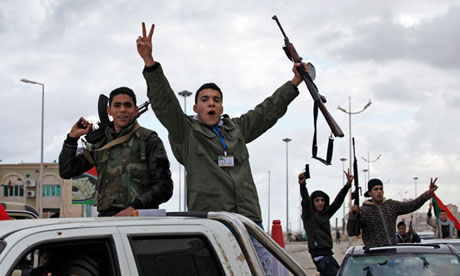Libyans fear standoff between Muslim Brotherhood and opposition forces
Chris Stephen in Tripoli
uruknet.info
Tripoli is braced for armed confrontation and threat of a coup as rebels mobilise across the country and blockade key oil ports Fears are growing in Libya of an Egypt-style standoff between the ruling Muslim Brotherhood and opposition forces, with rebels blockading key oil ports and the capital, Tripoli, braced for armed confrontation. Leaders in the provinces of Cyrenaica and Fezzan are considering breaking away from the centre with rebel militias mobilising across the country. With oil exports plunging 70%, the government has threatened to use force to capture oil terminals held by armed protesters, raising the risk of civil war. The capital is tense, with nightly exchanges of gunfire. Diplomats, along with many ordinary Libyans, observe a self-imposed dusk-to-dawn curfew. The president of congress, Nuri Abu Sahmain, has summoned militias allied to the Brotherhood to the capital, deploying troops across the city to forestall what his commanders say is the threat of a coup. This emergency measure has prompted the main opposition party, the centre-right National Forces Alliance, to desert congress, followed by several smaller ethnic parties, leaving the Brotherhood's Justice and Construction party heading a government with crumbling authority. "Congress has basically collapsed," said one diplomat in Tripoli. On Sunday, the interior minister, Mohamed Khalifa al Sheikh, resigned, accusing the prime minister, Ali Zaidan, of failing to support him. His resignation, following that of the deputy prime minister, Awadh al Barasi, has further weakened the government's authority. Zaidan has taken a hard line with protesters, threatening to storm the two biggest oil ports by force and warning international oil companies that their ships will be attacked if they buy oil from the rebels. "Any vessel not under contract to the National Oil Company that approaches the terminals will be bombed from the air and the sea," he said. The rebel guards blockading the ports in the eastern province of Cyrenaica, home to the bulk of Libya's oil, say they will resist if attacked. But the threats to bomb oil tankers has sent a shudder through the international shipping industry. John Hamilton, a London oil analyst, said: "It's deeply disturbing for [international] companies, that's the problem." The civil standoff stems from a demand for autonomy by the Cyrenaica Transitional Council, headed by a relative of Libya's former king, Sheikh Ahmed Al-Senussi. The province's MPs have already left the capital. Libya faces the prospect of a blockade of its remaining oil reserves after leaders of the southern province of Fezzan met in solidarity with Cyrenaica. Ethnic Berbers in the western mountains last week cut one of three pipelines bringing oil and gas north, and Fezzan leaders, who claim that they are starved of funds by central government, are considering a complete shutdown. "We don't want anything to do with a government that is now Muslim Brotherhood," said an ethnic Tobu delegate in the Fezzan meeting, who spoke on condition of anonymity. "We are forming an alliance with Cyrenaica, we have something in common with them – which is that we have nothing." Critics of the Justice and Construction party accuse it of building up the Libya Shield, a militia organisation, as a parallel force to the army. Much of Libya is resisting the so-called Isolation Law, which was directed at purging Gaddafi-era officials from the army, police and government, amid accusations that Brotherhood officials will replace them. Even the loyalty of Libya's small army is uncertain: its leaders are unlikely to accept dismissal. Amid these heightened civil tensions, the reach of the government's authority now stretches to the capital and the port city of Misrata, 100 miles west, but little further. As Tripoli's nightly gun battles roll on, residents are growing weary. Ali Tarhuni, a former US-based dissident who headed the rebel oil ministry during the Arab spring, is trying to mediate between the two sides. "We have a crisis," he said. "The security issue is the only priority that this government should have." Financial analysts warn that Libya's government is grappling not just with the management of the country but the creation of a ruling structure, which must be built from scratch after 40 years of dictatorship. Duncan Bullivant, chief executive of London security consultancy Henderson Risk, said: "Civil society is weak, dictatorships don't encourage it. So finding mechanisms to engage with and manage society is hard." The current crisis comes on the second anniversary of the end of the 2011 revolution, when Tripoli fell to rebel forces aided by Nato bombing. The intervening 24 months have seen successive governments fail to tackle Libya's militia violence, stagnant economy or jihadist attacks against foreign embassies. With unemployment soaring, frustration is building across the country, above all because the Muslim Brotherhood and National Forces Alliance have proved unable to work together. The promised constitution has failed to materialise, amid disputes about the power regions should wield and the role of Sharia law. Source |

No comments:
Post a Comment